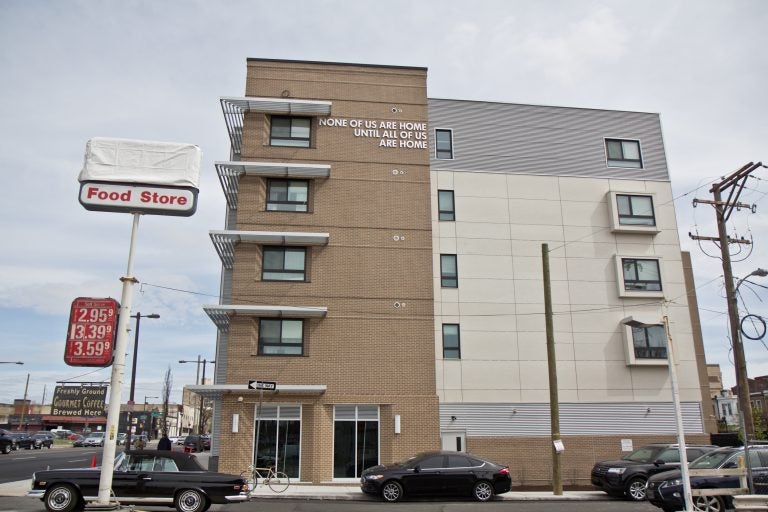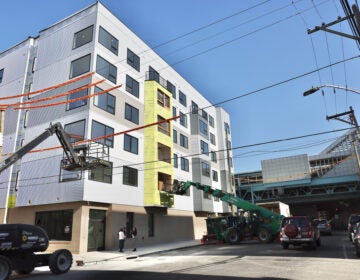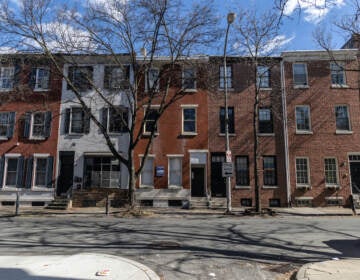Philly experiments with new rent voucher aimed at keeping families in their homes
The new program is an example of the local solutions emerging in cities as leaders grapple with growing affordability crises.

The Ruth Williams House at Broad and Boston Streets in Philadelphia has 88 units for those in need of affordable housing. (Kimberly Paynter/WHYY)
Philadelphia is testing a new approach to helping city residents pay their rent.
A new pilot program will provide monthly rent vouchers of $300 or less to help Philadelphia tenants who are spending more than a third of their income on rent and live in income-restricted properties built or renovated with taxpayer dollars.
“This will help keep a roof over people’s heads,” said Councilmember Helen Gym, who frequently advocates for renter protections. “This is particularly exciting because it’s targeted towards our neediest families, the 12% of Philadelphians who live in deep poverty.”
The pilot comes as part of a larger move in city politics to address affordability and a pervasive eviction crisis. Big cities like Philadelphia are increasingly experimenting with housing programs like this one, modeled after a similar program in Chicago, at a time when the federal government is retrenching from social welfare programs.
The $2 million city-funded program will be administered by the Philadelphia Housing Development Corporation, a nonprofit group that recently merged with the Philadelphia Redevelopment Authority. The agency will provide the rent money to the landlord for each eligible subsidized tenant.
A request for proposals issued on Wednesday seeks applications from property managers or owners of affordable housing developments funded with public subsidies, such as the federal Low-Income Housing Tax Credit program (LIHTC).
“We surveyed operators of affordable housing projects throughout the city and found pretty universally that a substantial number of their tenants are cost-burdened,” said Greg Heller, senior vice president of community investment at PHDC.
“Because incomes in Philadelphia are so low, [subsidized] rents are still too high for many renters to afford, and you need additional subsidy to help those families,” said Heller.
The LIHTC program was born when Ronald Reagan was in the White House, in the 1980s, as a market-driven alternative to more direct government subsidy programs like Section 8 vouchers or mid-century public housing.
The federal tax credit is now the principal means of funding affordable housing development in the United States. But because it relies on private investors, there is a limit to how deep the affordable subsidies can go. As a result, LIHTC projects often struggle to help those in the greatest need.
That’s where the city’s new vouchers will come in. The pilot program will be able to fund about 550 vouchers over the course of the year. Heller said he anticipates most tenants requiring the max of $300 a month, even though vouchers could technically be provided for smaller amounts based on a household’s need.
But after being informed of the program, some renter advocates questioned why the vouchers couldn’t simply be provided directly to the needy tenants and criticized what they see as a band-aid approach to rents that outpace many Philadelphians’ incomes.
“If used responsibly, shallow subsidies can keep people off the streets, especially in the event of an emergency, and avoiding homelessness is no small feat,” said Emily Black of the Philadelphia Tenants Union, which advocates rent control. “This is another way to get around the real solution to the problem: lowering rents so that regular Philadelphians can afford to live in this city.”
Heller said Philadelphia officials have reviewed municipal rent subsidy programs in other cities, and that the strategy of providing supports to landlords has a proven track record in other large municipalities like Chicago.
There will also be oversight provided to these landlords, who are already subject to more public sector scrutiny than their unsubsidized counterparts.
“These property managers already have to provide the tenant income verification, rent rolls, and other types of reporting to us and the Pennsylvania Housing Finance Agency,” said Heller. “For this program, we are going to review tenant incomes and rent and we are going to carry out inspections on units to make sure that they are compliant with HUD housing quality standards.”
A second pilot program will be rolled out later this year to target the unsubsidized housing market in low-income neighborhoods. Details on this second phase are scant, although it will also have a one-year budget of $2 million.
Heller said that none of the details are settled about the forthcoming program. It’s not yet clear whether the second tranche of vouchers will go to tenants or landlords.
But given that market-rate landlords do not have previously established relationships with public agencies, the barriers to policing such a program would be higher, perhaps making it more feasible to give money directly to needy renters.
“If this works well, I would like to see it expand to private housing,” said Councilmember Gym, who frequently champions renter-friendly legislation. “If it expands to private housing beyond the subsidized market, it will become very relevant and very necessary to discuss whether subsidies go to tenants or landlords.”
The funding for both voucher programs comes from new monies devoted to the Housing Trust Fund in the wake of a compromise reached between City Council and Jim Kenney’s administration. Councilmember Maria Quiñones-Sánchez was one of the driving forces behind that deal, and she too will be watching the program closely.
“I wish we were already giving out vouchers in the private market,” said Quiñones-Sánchez. “I’m excited about providing further subsidy to [poorer] people. This program allows us to reach a different constituency.”
 WHYY is one of over 20 news organizations producing Broke in Philly, a collaborative reporting project on solutions to poverty and the city’s push towards economic justice. Follow us at @BrokeInPhilly.
WHYY is one of over 20 news organizations producing Broke in Philly, a collaborative reporting project on solutions to poverty and the city’s push towards economic justice. Follow us at @BrokeInPhilly.
WHYY is your source for fact-based, in-depth journalism and information. As a nonprofit organization, we rely on financial support from readers like you. Please give today.







